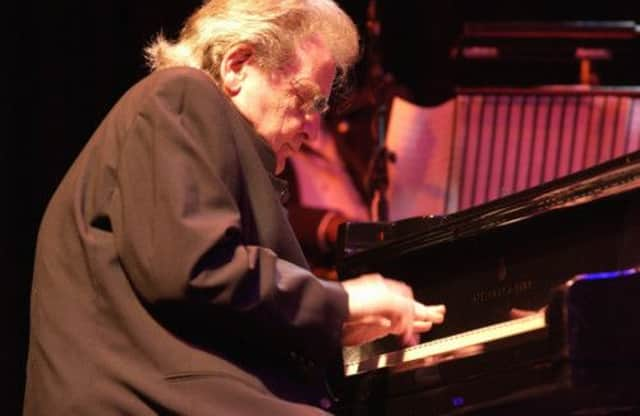Obituary: Stan Tracey, CBE, jazz musician. Composer of the suite Under Milk Wood


STAN Tracey was one of the resounding pillars of British jazz music and acclaimed as a pianist of real originality. He was entirely self-taught, although he owed much to the playing of Duke Ellington (whom he greatly revered): Tracey evolved a style all of his own – his idiosyncratic playing was easily recognised by fans. He was a truly original voice in British jazz and much celebrated as a pioneer of the genre. As a performer, he had a striking originality as a soloist and was an inspiring accompanist – he subtly encouraged great musicians from New York to explore new versions in jam sessions. He was labelled The Godfather of the British jazz piano.
In 1965, he widened the appreciation of the musical genre after he wrote Jazz Suite, inspired by Dylan Thomas’s Under Milk Wood, which he recorded with his own quartet and the Glasgow-born saxophonist Bobby Wellins.
Advertisement
Hide AdAdvertisement
Hide AdStanley William Tracey was the son of a bartender, who attended a local school till he was 12. His talent as a musician was noticed and he entertained the troops with musical groups. In 1944, he was introduced to jazz and taught himself the piano, during National Service with the Royal Air Force. He joined the RAF Gang Show, performing with Peter Sellers and Tony Hancock. Tracey then found work with bands on the transatlantic liners and did sessions in London with the Ted Heath band.
In 1960, he became the house pianist at the burgeoning Ronnie Scott’s Club in London’s Soho. Tracey became well known in the club and did jam sessions with US visitors such as Zoot Sims, Dexter Gordon, Stan Getz, Sonny Rollins and Roland Kirk. It was a gruelling regime – he did three sessions a night, six nights a week. By 1967, his health was deteriorating and he left Ronnie Scott’s to take on freelance work.
But his poor health did not prevent Tracey from writing his eight-part suite based on Thomas’s radio drama Under Milk Wood. In fact, he admitted that much of it was written on the night bus returning from Soho.
The 1965 recording was hailed as a landmark and critics noted the subtle musical understanding between Tracey and Wellins. There was a haunting beauty and refined informality in their playing, which captured the diverse characters in the Thomas poem.
Other compositions included the soundtrack for Alfie, starring Michael Caine, and his suite Alice in Jazz Land (1966), based loosely on the writings of Lewis Carroll. In the late 1960s, Tracey made many acclaimed recordings, notably a tribute to Ellington, entitled We Love You Madly.
The 1970s were not easy, but Tracey joined such avant-garde groups as the Splinters and played with Tubby Hayes. There was a celebration of his career in 1973 at London’s South Bank and the event rejuvenated his career.
Tracey was never tied down by convention or musical tradition. He received two prominent commissions: one to compose the Honk Kong Suite, from Chris Patten, the last governor of the colony, and The Amandia Suite to celebrate the trades union merger that created Unison.
In 1990, Tracey was asked to compose a piece for the 900th anniversary of Durham Cathedral. He based the music on Ellington’s Sacred Concerts involving choir, solo singers, tap dancer, narrator and his big own band. The piece has gained in popularity and in July of this year Tracey performed the original Ellington both at the Edinburgh Jazz Festival and in Dunfermline Abbey. Tracey was not in the best of health prior to the concert, but he told The Scotsman: “It’s a tremendous work and I’m looking forward to it – as I always do.”
Advertisement
Hide AdAdvertisement
Hide AdTracey often visited Scotland, performing at festivals and concerts. Apart from the Ellington, Tracey was heard in July with his own trio and Wellins in an emotional reunion. Sadly, last week Tracey had to cancel a concert at Glasgow’s Old Fruitmarket because of ill health and was replaced by Paul Harrison.
In June of this year, Tracey closed the Glasgow Jazz Festival when he and Wellins performed. He often appeared on jazz programmes on the BBC – notably with Jools Holland, Jazz Record Request and The Jazz House with Stephen Duffy on BBC Radio Scotland. In 2012, Duffy presented a show about Wellins in which he featured the collaborations with Tracey – suitably including Pen Pals from Milk Wood.
Tracey, who became a CBE in 2008, had an immense influence on British jazz musicians and his final album, The Flying Pig, comes out next month. Tracey’s band – with his son Clark on drums – was booked to play at the London Jazz Festival last month, but the pianist had to cancel. Tracey’s wife Jackie died in 2009, and he is survived by his son.